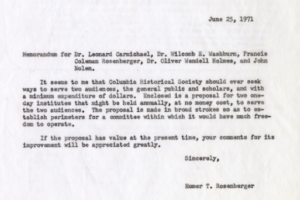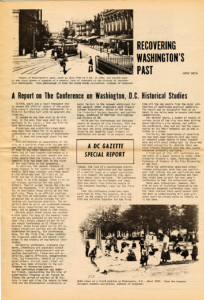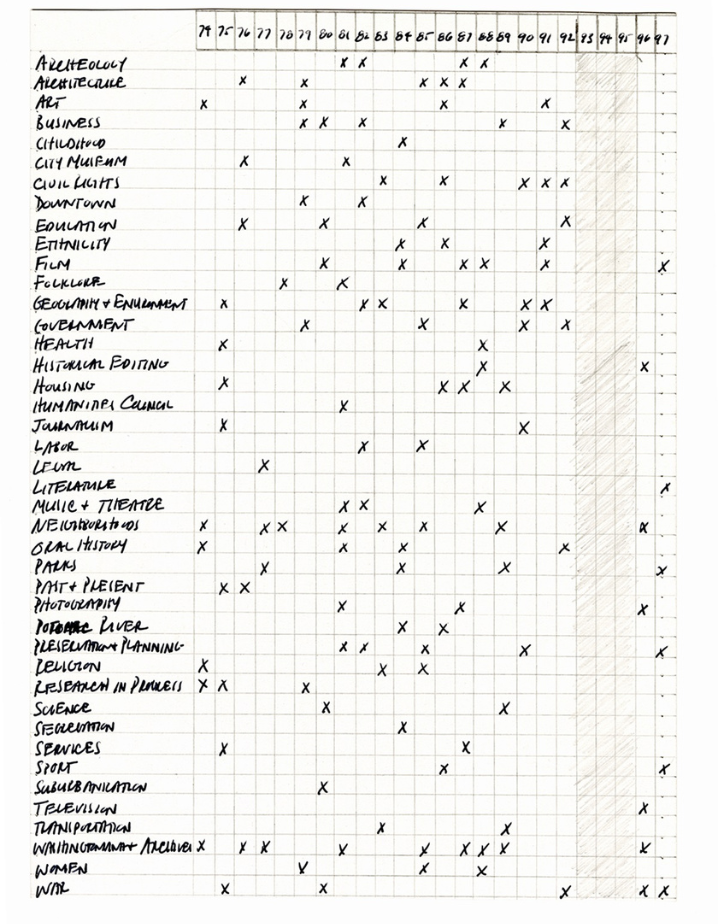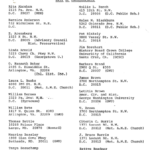![]()

![]()
It began with an idea, and became a force.
For 50 years, what started as the First Annual Conference on D.C. Historical Studies has been a volunteer-run, community-driven annual event that has grown from a one-day series of presentations in 1974, to a three-day meeting of the minds in 2024.
From the first few conferences alone, there are those whose names continue to populate undergraduate and graduate school syllabi (such as Howard Gillette, James Borchert, Letitia Woods Brown, Roderick French, Steven Diner) and whose life’s work continue to influence researchers, students, and enthusiasts whether or not they realize it (including Milton S. Byam, Francis Rosenberger, Albert I. Cassell, Betty Culpepper, Tony Sarmiento, Hal S. Chase). And that’s just scratching the surface.
 Now known as the DC History Conference, this annual event is a springboard for academics. A showcase for local talent. An extra credit assignment for students from high school through graduate school. A day out of the office for those in the professional local cultural heritage arena, a launch space for filmmakers, artists, and authors, and fodder for media.
Now known as the DC History Conference, this annual event is a springboard for academics. A showcase for local talent. An extra credit assignment for students from high school through graduate school. A day out of the office for those in the professional local cultural heritage arena, a launch space for filmmakers, artists, and authors, and fodder for media.
Over the years, in a multitude of iterations, the conference has convened thousands of people from all walks of life who are brought together by one single consistent common denominator: A passion for exploring, sharing, complicating, and amplifying the local history of Washington, D.C.
And what’s been on the minds of these folks? On the occasion of the 25th conference, a volunteer named Marjorie Belcher created a lovely paper chart indicating the broad topics that had been covered through the years up to that point (there were conferences in 1993-1995, but perhaps the programs couldn’t be located!).

And for the 50th, thanks to Nora Smolonsky, graduate student and a 2024 intern at the DC History Center, now you can take a look at scans of all of the programs from past conferences (compiled from the 1970s, 1980s, 1990s, 2000s, 2010s, and through this year’s conference)!
Wondering who delivered the Letitia Woods Brown Memorial Lecture in a particular year? Can’t remember the first time you presented at the conference? Curious about who has been behind-the-scenes organizing these annual events year after year or when Latino/a/x or LGBTQ history was first addressed? Confused as to which organization hosted in which year? More of a searcher than a browser? You’re in luck: You can also explore the DC History Conference Through the Years, a spreadsheet where Nora compiled all presenters, volunteers, locations, Letitia Woods Brown Memorial Lecturers and topics, and the conference presentation themes as presented in the printed programs.
Yet there are many things that printed programs don’t tell us such as . . .
 Who attended? (Fun fact: The first participants list was eight typed pages. There are folks attending the 2024 conference who were there the first year, including Jim Flack, an integral player in the conference throughout the years!)
Who attended? (Fun fact: The first participants list was eight typed pages. There are folks attending the 2024 conference who were there the first year, including Jim Flack, an integral player in the conference throughout the years!)
Who was key behind the behind-the-scenes?
Who intended to present but cancelled, or had someone sub for them?
Which organizations supported individual research efforts that lead to a presentation, whether or not the organization was an official conference sponsor?
Why were some parts of the conference at one location, and others at another in a particular year?
Whose name was inadvertently left off the program and not noticed until after it had gone to print?
Please keep in mind both those you see recognized, and those you don’t, as you explore 50 years of conferences dedicated to local DC history.
To those who got us here, and those who will keep us going: Thank you.